Organisational Behaviour Report: Analysing Tesco's Performance
VerifiedAdded on 2020/12/18
|17
|5391
|433
Report
AI Summary
This report provides an in-depth analysis of organisational behaviour within Tesco, a multinational retail company. The report begins by assessing the influence of organisational culture, power dynamics, and politics on employee and team performance. It explores different types of power, including coercive and reward power, and examines Handy's Culture model to understand how culture impacts the behaviour of individuals and teams. Furthermore, the report delves into various motivational theories and techniques employed by Tesco's management, differentiating between intrinsic and extrinsic motivation and analyzing content theories such as Maslow's hierarchy of needs. The report also discusses the importance of effective teamwork and distinguishes between effective and ineffective teams. Finally, the report concludes by discussing the concepts and philosophies of organisational behaviour, providing insights for managing various workplace situations within the context of Tesco.
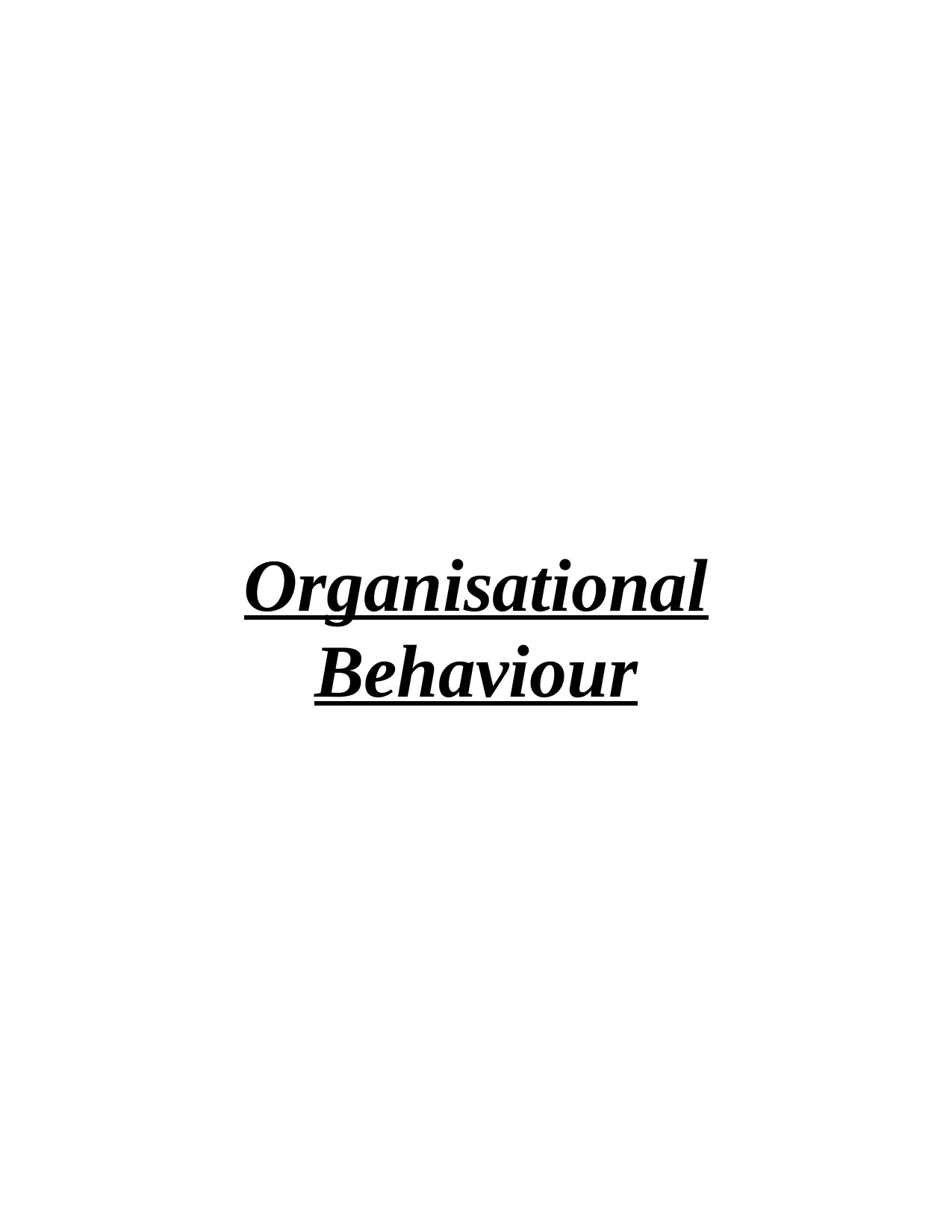
Organisational
Behaviour
Behaviour
Paraphrase This Document
Need a fresh take? Get an instant paraphrase of this document with our AI Paraphraser
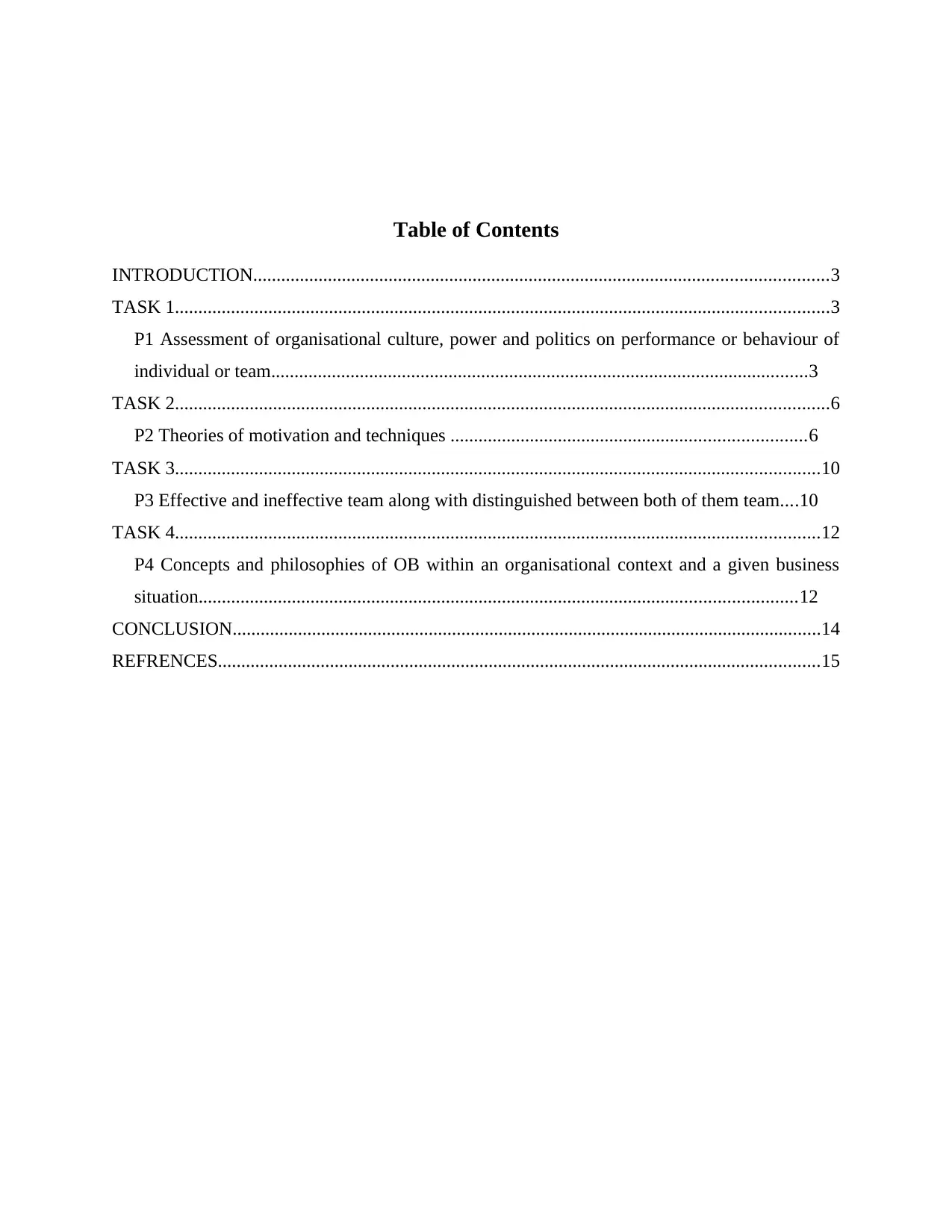
Table of Contents
INTRODUCTION...........................................................................................................................3
TASK 1............................................................................................................................................3
P1 Assessment of organisational culture, power and politics on performance or behaviour of
individual or team...................................................................................................................3
TASK 2............................................................................................................................................6
P2 Theories of motivation and techniques ............................................................................6
TASK 3..........................................................................................................................................10
P3 Effective and ineffective team along with distinguished between both of them team....10
TASK 4..........................................................................................................................................12
P4 Concepts and philosophies of OB within an organisational context and a given business
situation................................................................................................................................12
CONCLUSION..............................................................................................................................14
REFRENCES.................................................................................................................................15
INTRODUCTION...........................................................................................................................3
TASK 1............................................................................................................................................3
P1 Assessment of organisational culture, power and politics on performance or behaviour of
individual or team...................................................................................................................3
TASK 2............................................................................................................................................6
P2 Theories of motivation and techniques ............................................................................6
TASK 3..........................................................................................................................................10
P3 Effective and ineffective team along with distinguished between both of them team....10
TASK 4..........................................................................................................................................12
P4 Concepts and philosophies of OB within an organisational context and a given business
situation................................................................................................................................12
CONCLUSION..............................................................................................................................14
REFRENCES.................................................................................................................................15
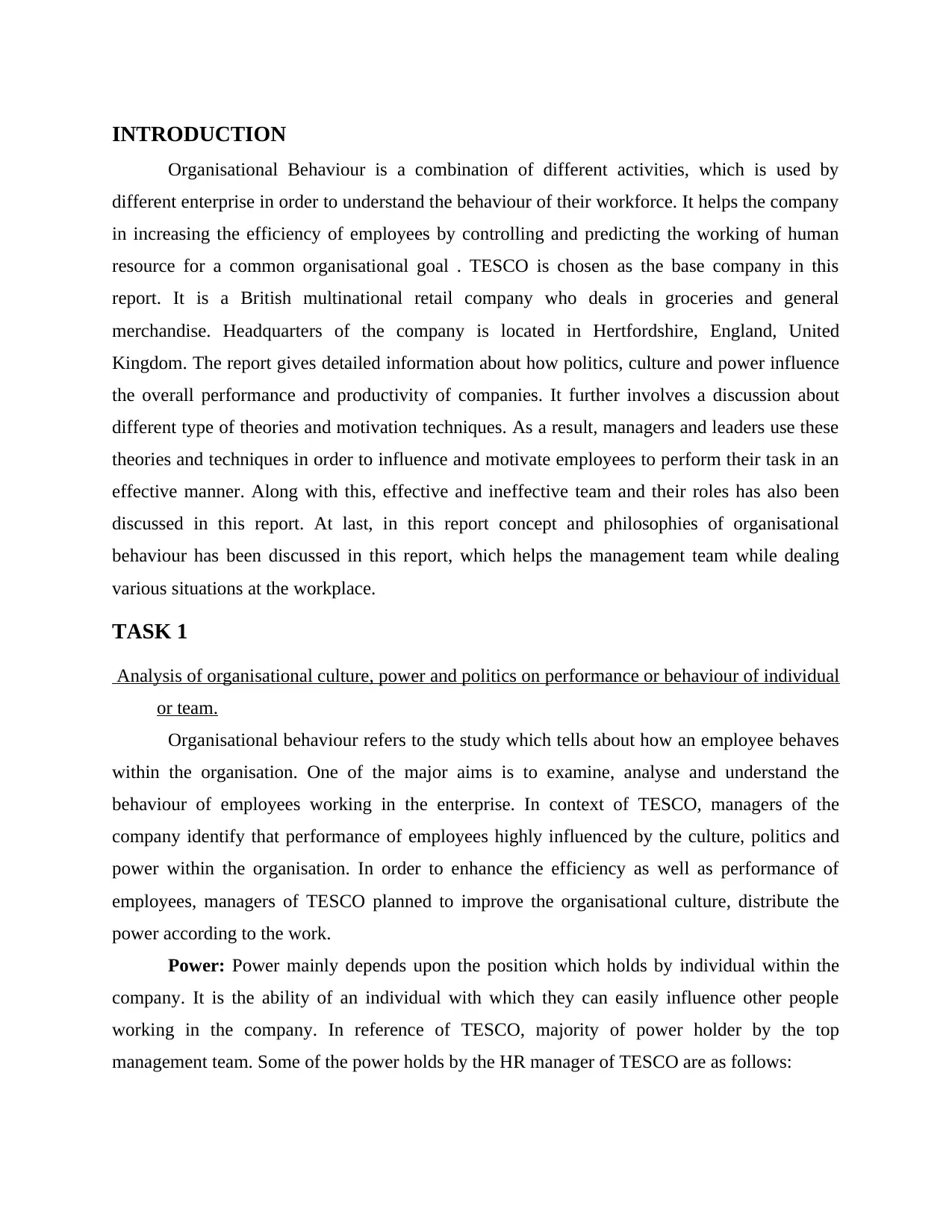
INTRODUCTION
Organisational Behaviour is a combination of different activities, which is used by
different enterprise in order to understand the behaviour of their workforce. It helps the company
in increasing the efficiency of employees by controlling and predicting the working of human
resource for a common organisational goal . TESCO is chosen as the base company in this
report. It is a British multinational retail company who deals in groceries and general
merchandise. Headquarters of the company is located in Hertfordshire, England, United
Kingdom. The report gives detailed information about how politics, culture and power influence
the overall performance and productivity of companies. It further involves a discussion about
different type of theories and motivation techniques. As a result, managers and leaders use these
theories and techniques in order to influence and motivate employees to perform their task in an
effective manner. Along with this, effective and ineffective team and their roles has also been
discussed in this report. At last, in this report concept and philosophies of organisational
behaviour has been discussed in this report, which helps the management team while dealing
various situations at the workplace.
TASK 1
Analysis of organisational culture, power and politics on performance or behaviour of individual
or team.
Organisational behaviour refers to the study which tells about how an employee behaves
within the organisation. One of the major aims is to examine, analyse and understand the
behaviour of employees working in the enterprise. In context of TESCO, managers of the
company identify that performance of employees highly influenced by the culture, politics and
power within the organisation. In order to enhance the efficiency as well as performance of
employees, managers of TESCO planned to improve the organisational culture, distribute the
power according to the work.
Power: Power mainly depends upon the position which holds by individual within the
company. It is the ability of an individual with which they can easily influence other people
working in the company. In reference of TESCO, majority of power holder by the top
management team. Some of the power holds by the HR manager of TESCO are as follows:
Organisational Behaviour is a combination of different activities, which is used by
different enterprise in order to understand the behaviour of their workforce. It helps the company
in increasing the efficiency of employees by controlling and predicting the working of human
resource for a common organisational goal . TESCO is chosen as the base company in this
report. It is a British multinational retail company who deals in groceries and general
merchandise. Headquarters of the company is located in Hertfordshire, England, United
Kingdom. The report gives detailed information about how politics, culture and power influence
the overall performance and productivity of companies. It further involves a discussion about
different type of theories and motivation techniques. As a result, managers and leaders use these
theories and techniques in order to influence and motivate employees to perform their task in an
effective manner. Along with this, effective and ineffective team and their roles has also been
discussed in this report. At last, in this report concept and philosophies of organisational
behaviour has been discussed in this report, which helps the management team while dealing
various situations at the workplace.
TASK 1
Analysis of organisational culture, power and politics on performance or behaviour of individual
or team.
Organisational behaviour refers to the study which tells about how an employee behaves
within the organisation. One of the major aims is to examine, analyse and understand the
behaviour of employees working in the enterprise. In context of TESCO, managers of the
company identify that performance of employees highly influenced by the culture, politics and
power within the organisation. In order to enhance the efficiency as well as performance of
employees, managers of TESCO planned to improve the organisational culture, distribute the
power according to the work.
Power: Power mainly depends upon the position which holds by individual within the
company. It is the ability of an individual with which they can easily influence other people
working in the company. In reference of TESCO, majority of power holder by the top
management team. Some of the power holds by the HR manager of TESCO are as follows:
⊘ This is a preview!⊘
Do you want full access?
Subscribe today to unlock all pages.

Trusted by 1+ million students worldwide
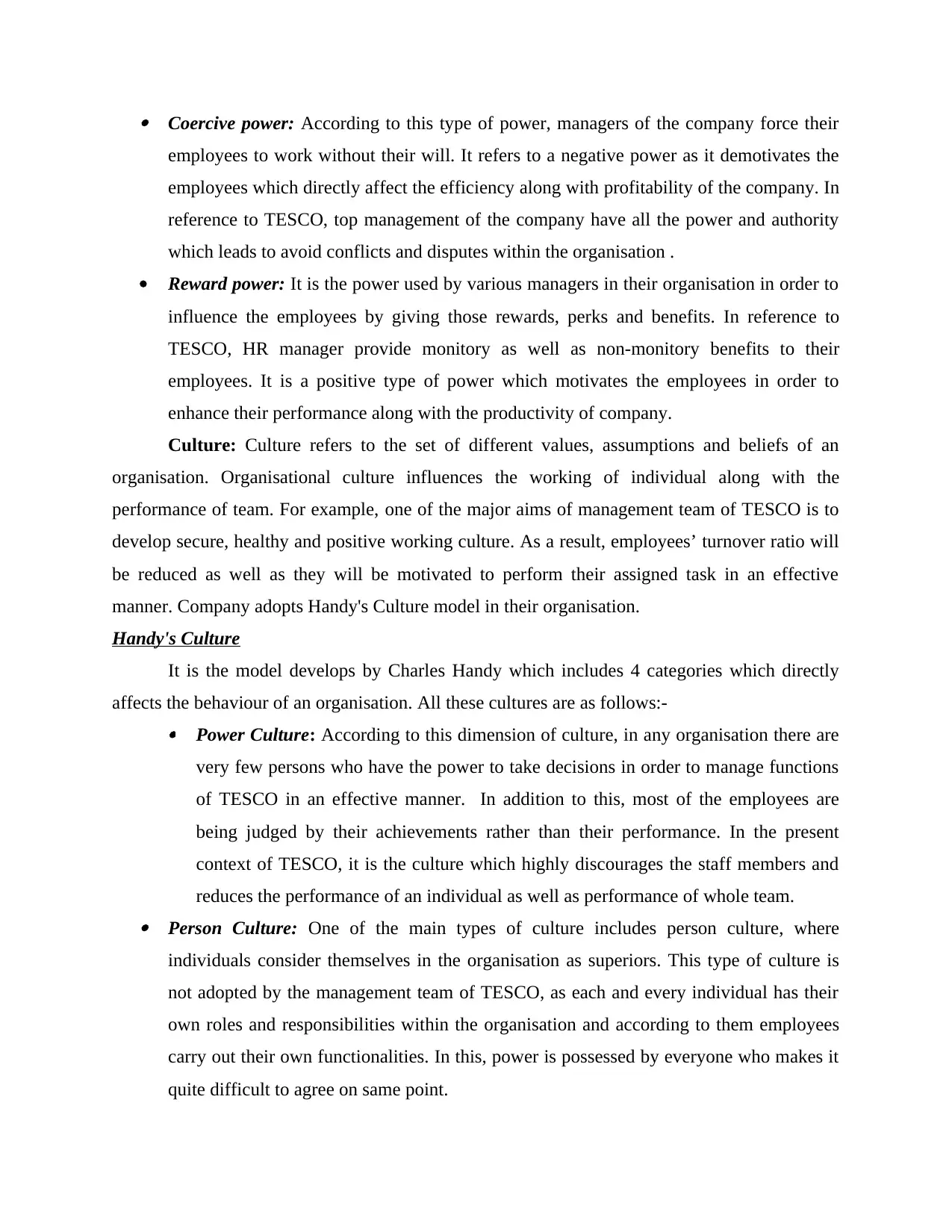
Coercive power: According to this type of power, managers of the company force their
employees to work without their will. It refers to a negative power as it demotivates the
employees which directly affect the efficiency along with profitability of the company. In
reference to TESCO, top management of the company have all the power and authority
which leads to avoid conflicts and disputes within the organisation .
Reward power: It is the power used by various managers in their organisation in order to
influence the employees by giving those rewards, perks and benefits. In reference to
TESCO, HR manager provide monitory as well as non-monitory benefits to their
employees. It is a positive type of power which motivates the employees in order to
enhance their performance along with the productivity of company.
Culture: Culture refers to the set of different values, assumptions and beliefs of an
organisation. Organisational culture influences the working of individual along with the
performance of team. For example, one of the major aims of management team of TESCO is to
develop secure, healthy and positive working culture. As a result, employees’ turnover ratio will
be reduced as well as they will be motivated to perform their assigned task in an effective
manner. Company adopts Handy's Culture model in their organisation.
Handy's Culture
It is the model develops by Charles Handy which includes 4 categories which directly
affects the behaviour of an organisation. All these cultures are as follows:-
Power Culture: According to this dimension of culture, in any organisation there are
very few persons who have the power to take decisions in order to manage functions
of TESCO in an effective manner. In addition to this, most of the employees are
being judged by their achievements rather than their performance. In the present
context of TESCO, it is the culture which highly discourages the staff members and
reduces the performance of an individual as well as performance of whole team. Person Culture: One of the main types of culture includes person culture, where
individuals consider themselves in the organisation as superiors. This type of culture is
not adopted by the management team of TESCO, as each and every individual has their
own roles and responsibilities within the organisation and according to them employees
carry out their own functionalities. In this, power is possessed by everyone who makes it
quite difficult to agree on same point.
employees to work without their will. It refers to a negative power as it demotivates the
employees which directly affect the efficiency along with profitability of the company. In
reference to TESCO, top management of the company have all the power and authority
which leads to avoid conflicts and disputes within the organisation .
Reward power: It is the power used by various managers in their organisation in order to
influence the employees by giving those rewards, perks and benefits. In reference to
TESCO, HR manager provide monitory as well as non-monitory benefits to their
employees. It is a positive type of power which motivates the employees in order to
enhance their performance along with the productivity of company.
Culture: Culture refers to the set of different values, assumptions and beliefs of an
organisation. Organisational culture influences the working of individual along with the
performance of team. For example, one of the major aims of management team of TESCO is to
develop secure, healthy and positive working culture. As a result, employees’ turnover ratio will
be reduced as well as they will be motivated to perform their assigned task in an effective
manner. Company adopts Handy's Culture model in their organisation.
Handy's Culture
It is the model develops by Charles Handy which includes 4 categories which directly
affects the behaviour of an organisation. All these cultures are as follows:-
Power Culture: According to this dimension of culture, in any organisation there are
very few persons who have the power to take decisions in order to manage functions
of TESCO in an effective manner. In addition to this, most of the employees are
being judged by their achievements rather than their performance. In the present
context of TESCO, it is the culture which highly discourages the staff members and
reduces the performance of an individual as well as performance of whole team. Person Culture: One of the main types of culture includes person culture, where
individuals consider themselves in the organisation as superiors. This type of culture is
not adopted by the management team of TESCO, as each and every individual has their
own roles and responsibilities within the organisation and according to them employees
carry out their own functionalities. In this, power is possessed by everyone who makes it
quite difficult to agree on same point.
Paraphrase This Document
Need a fresh take? Get an instant paraphrase of this document with our AI Paraphraser
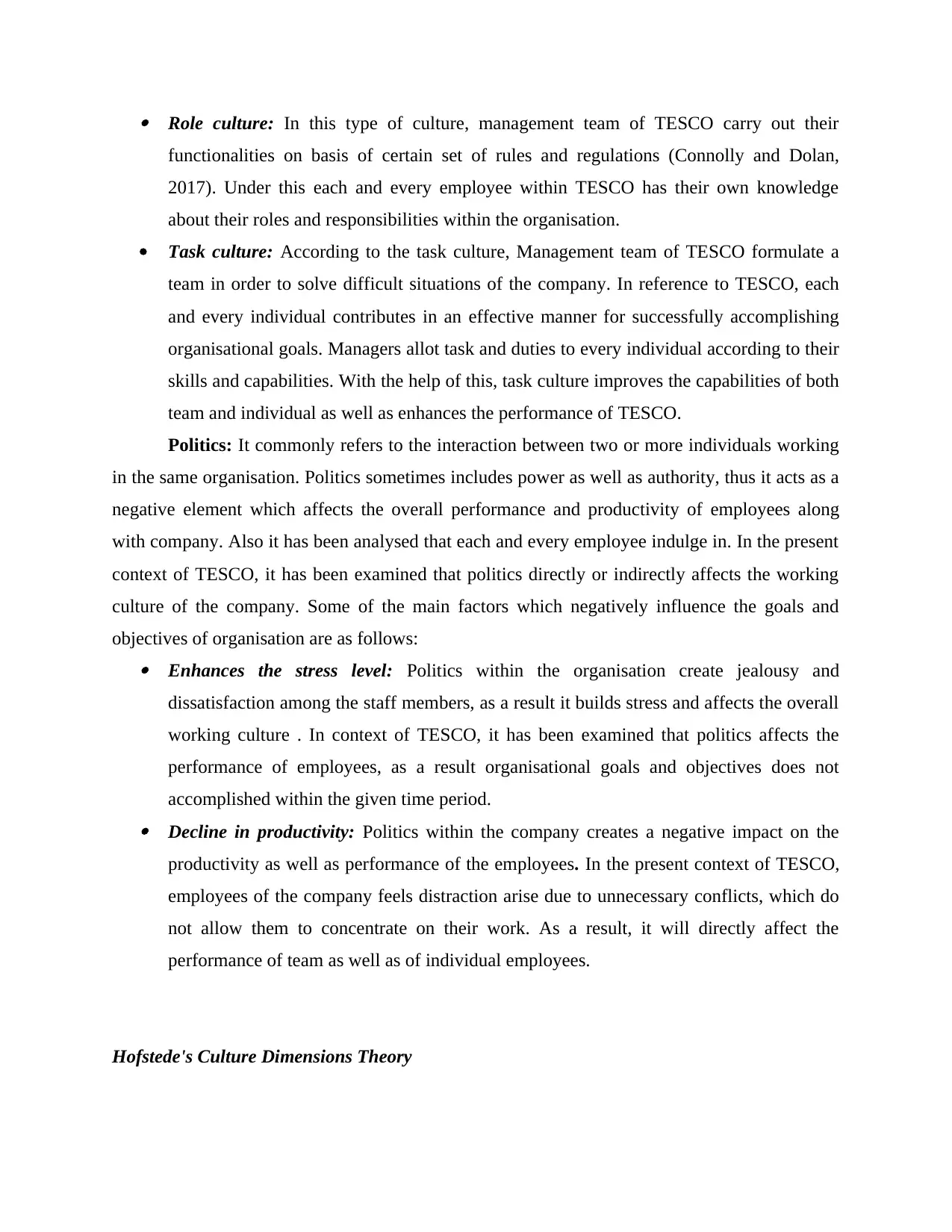
Role culture: In this type of culture, management team of TESCO carry out their
functionalities on basis of certain set of rules and regulations (Connolly and Dolan,
2017). Under this each and every employee within TESCO has their own knowledge
about their roles and responsibilities within the organisation.
Task culture: According to the task culture, Management team of TESCO formulate a
team in order to solve difficult situations of the company. In reference to TESCO, each
and every individual contributes in an effective manner for successfully accomplishing
organisational goals. Managers allot task and duties to every individual according to their
skills and capabilities. With the help of this, task culture improves the capabilities of both
team and individual as well as enhances the performance of TESCO.
Politics: It commonly refers to the interaction between two or more individuals working
in the same organisation. Politics sometimes includes power as well as authority, thus it acts as a
negative element which affects the overall performance and productivity of employees along
with company. Also it has been analysed that each and every employee indulge in. In the present
context of TESCO, it has been examined that politics directly or indirectly affects the working
culture of the company. Some of the main factors which negatively influence the goals and
objectives of organisation are as follows: Enhances the stress level: Politics within the organisation create jealousy and
dissatisfaction among the staff members, as a result it builds stress and affects the overall
working culture . In context of TESCO, it has been examined that politics affects the
performance of employees, as a result organisational goals and objectives does not
accomplished within the given time period. Decline in productivity: Politics within the company creates a negative impact on the
productivity as well as performance of the employees. In the present context of TESCO,
employees of the company feels distraction arise due to unnecessary conflicts, which do
not allow them to concentrate on their work. As a result, it will directly affect the
performance of team as well as of individual employees.
Hofstede's Culture Dimensions Theory
functionalities on basis of certain set of rules and regulations (Connolly and Dolan,
2017). Under this each and every employee within TESCO has their own knowledge
about their roles and responsibilities within the organisation.
Task culture: According to the task culture, Management team of TESCO formulate a
team in order to solve difficult situations of the company. In reference to TESCO, each
and every individual contributes in an effective manner for successfully accomplishing
organisational goals. Managers allot task and duties to every individual according to their
skills and capabilities. With the help of this, task culture improves the capabilities of both
team and individual as well as enhances the performance of TESCO.
Politics: It commonly refers to the interaction between two or more individuals working
in the same organisation. Politics sometimes includes power as well as authority, thus it acts as a
negative element which affects the overall performance and productivity of employees along
with company. Also it has been analysed that each and every employee indulge in. In the present
context of TESCO, it has been examined that politics directly or indirectly affects the working
culture of the company. Some of the main factors which negatively influence the goals and
objectives of organisation are as follows: Enhances the stress level: Politics within the organisation create jealousy and
dissatisfaction among the staff members, as a result it builds stress and affects the overall
working culture . In context of TESCO, it has been examined that politics affects the
performance of employees, as a result organisational goals and objectives does not
accomplished within the given time period. Decline in productivity: Politics within the company creates a negative impact on the
productivity as well as performance of the employees. In the present context of TESCO,
employees of the company feels distraction arise due to unnecessary conflicts, which do
not allow them to concentrate on their work. As a result, it will directly affect the
performance of team as well as of individual employees.
Hofstede's Culture Dimensions Theory
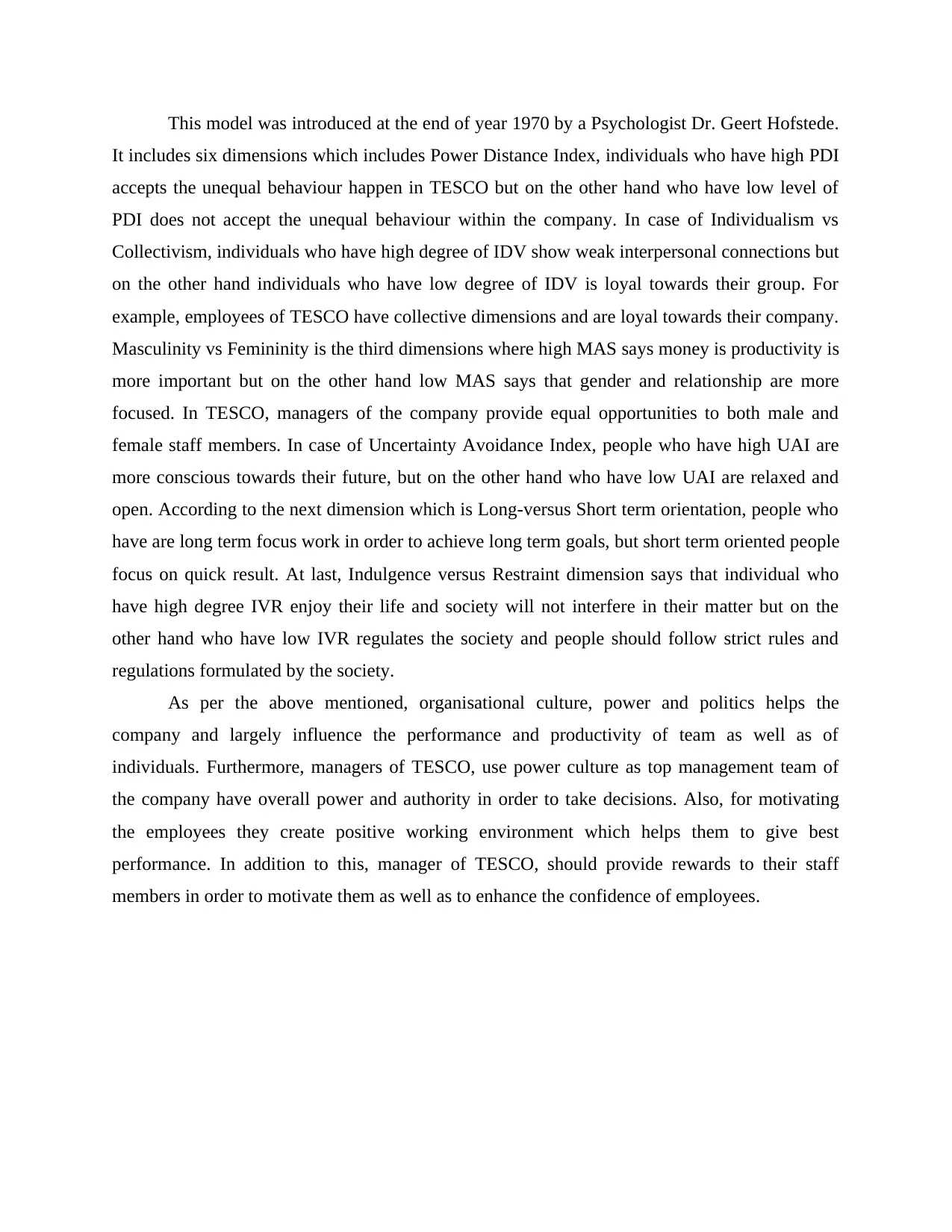
This model was introduced at the end of year 1970 by a Psychologist Dr. Geert Hofstede.
It includes six dimensions which includes Power Distance Index, individuals who have high PDI
accepts the unequal behaviour happen in TESCO but on the other hand who have low level of
PDI does not accept the unequal behaviour within the company. In case of Individualism vs
Collectivism, individuals who have high degree of IDV show weak interpersonal connections but
on the other hand individuals who have low degree of IDV is loyal towards their group. For
example, employees of TESCO have collective dimensions and are loyal towards their company.
Masculinity vs Femininity is the third dimensions where high MAS says money is productivity is
more important but on the other hand low MAS says that gender and relationship are more
focused. In TESCO, managers of the company provide equal opportunities to both male and
female staff members. In case of Uncertainty Avoidance Index, people who have high UAI are
more conscious towards their future, but on the other hand who have low UAI are relaxed and
open. According to the next dimension which is Long-versus Short term orientation, people who
have are long term focus work in order to achieve long term goals, but short term oriented people
focus on quick result. At last, Indulgence versus Restraint dimension says that individual who
have high degree IVR enjoy their life and society will not interfere in their matter but on the
other hand who have low IVR regulates the society and people should follow strict rules and
regulations formulated by the society.
As per the above mentioned, organisational culture, power and politics helps the
company and largely influence the performance and productivity of team as well as of
individuals. Furthermore, managers of TESCO, use power culture as top management team of
the company have overall power and authority in order to take decisions. Also, for motivating
the employees they create positive working environment which helps them to give best
performance. In addition to this, manager of TESCO, should provide rewards to their staff
members in order to motivate them as well as to enhance the confidence of employees.
It includes six dimensions which includes Power Distance Index, individuals who have high PDI
accepts the unequal behaviour happen in TESCO but on the other hand who have low level of
PDI does not accept the unequal behaviour within the company. In case of Individualism vs
Collectivism, individuals who have high degree of IDV show weak interpersonal connections but
on the other hand individuals who have low degree of IDV is loyal towards their group. For
example, employees of TESCO have collective dimensions and are loyal towards their company.
Masculinity vs Femininity is the third dimensions where high MAS says money is productivity is
more important but on the other hand low MAS says that gender and relationship are more
focused. In TESCO, managers of the company provide equal opportunities to both male and
female staff members. In case of Uncertainty Avoidance Index, people who have high UAI are
more conscious towards their future, but on the other hand who have low UAI are relaxed and
open. According to the next dimension which is Long-versus Short term orientation, people who
have are long term focus work in order to achieve long term goals, but short term oriented people
focus on quick result. At last, Indulgence versus Restraint dimension says that individual who
have high degree IVR enjoy their life and society will not interfere in their matter but on the
other hand who have low IVR regulates the society and people should follow strict rules and
regulations formulated by the society.
As per the above mentioned, organisational culture, power and politics helps the
company and largely influence the performance and productivity of team as well as of
individuals. Furthermore, managers of TESCO, use power culture as top management team of
the company have overall power and authority in order to take decisions. Also, for motivating
the employees they create positive working environment which helps them to give best
performance. In addition to this, manager of TESCO, should provide rewards to their staff
members in order to motivate them as well as to enhance the confidence of employees.
⊘ This is a preview!⊘
Do you want full access?
Subscribe today to unlock all pages.

Trusted by 1+ million students worldwide

TASK 2
Analysis of various motivational theories and techniques
It refers to the procedure used by management team of the company with the help of
which workforce of the organization get encouraged and contributes in order to attain
organisational goals effectively. Along with this, one of the major element used by companies in
order to retain their employees for a long period of time. There are various methods used by
managers to encourage their staff members such as rewards, perks, incentives, promotions, good
working condition and so on. In the present context of TESCO, managers also use these
motivational tools and techniques for encouraging there employees .Two types of motivations
are commonly used by organisations which are as follows:- Intrinsic Motivation – It is the behaviour driven by the internal rewards. Intrinsic
motivation is the factor where employees are motivated by internal factors rather than
external factors. It involves elements such as relief, satisfaction, thirst and many others.
Extrinsic Motivation – It is the factor where individuals are motivated by external factors
which include monetary as well as non-monetary forms. These can be in form of
appraisal, benefits, incentives and many more.
Managers of TESCO adopt extrinsic motivation technique in their organisation. There are
some theories used by managers in order to motivate and encourage their staff members. These
theories are categorized within two categories i.e., Content and process theory. These theories
are discussed in detail:
Content Theory – Maslow hierarchy need theory is the content theory of motivation
used by every organisation . In context of TESCO, managers use this theory in order to satisfy
needs of employees according to their requirements. It is a five tier model which includes
physiological, love, safety, self-actualization and esteem needs. Physiological Needs – It includes the basic requirement of human beings which includes
air, water, shelter, food and many more. In the present context of TESCO, managers of
the company first satisfy the basic requirements of employees which provide them food,
shelter and so on. Safety and security needs – It refers to keep the individual safe by providing them
security. In reference to TESCO, management team of the company provide job security,
Analysis of various motivational theories and techniques
It refers to the procedure used by management team of the company with the help of
which workforce of the organization get encouraged and contributes in order to attain
organisational goals effectively. Along with this, one of the major element used by companies in
order to retain their employees for a long period of time. There are various methods used by
managers to encourage their staff members such as rewards, perks, incentives, promotions, good
working condition and so on. In the present context of TESCO, managers also use these
motivational tools and techniques for encouraging there employees .Two types of motivations
are commonly used by organisations which are as follows:- Intrinsic Motivation – It is the behaviour driven by the internal rewards. Intrinsic
motivation is the factor where employees are motivated by internal factors rather than
external factors. It involves elements such as relief, satisfaction, thirst and many others.
Extrinsic Motivation – It is the factor where individuals are motivated by external factors
which include monetary as well as non-monetary forms. These can be in form of
appraisal, benefits, incentives and many more.
Managers of TESCO adopt extrinsic motivation technique in their organisation. There are
some theories used by managers in order to motivate and encourage their staff members. These
theories are categorized within two categories i.e., Content and process theory. These theories
are discussed in detail:
Content Theory – Maslow hierarchy need theory is the content theory of motivation
used by every organisation . In context of TESCO, managers use this theory in order to satisfy
needs of employees according to their requirements. It is a five tier model which includes
physiological, love, safety, self-actualization and esteem needs. Physiological Needs – It includes the basic requirement of human beings which includes
air, water, shelter, food and many more. In the present context of TESCO, managers of
the company first satisfy the basic requirements of employees which provide them food,
shelter and so on. Safety and security needs – It refers to keep the individual safe by providing them
security. In reference to TESCO, management team of the company provide job security,
Paraphrase This Document
Need a fresh take? Get an instant paraphrase of this document with our AI Paraphraser
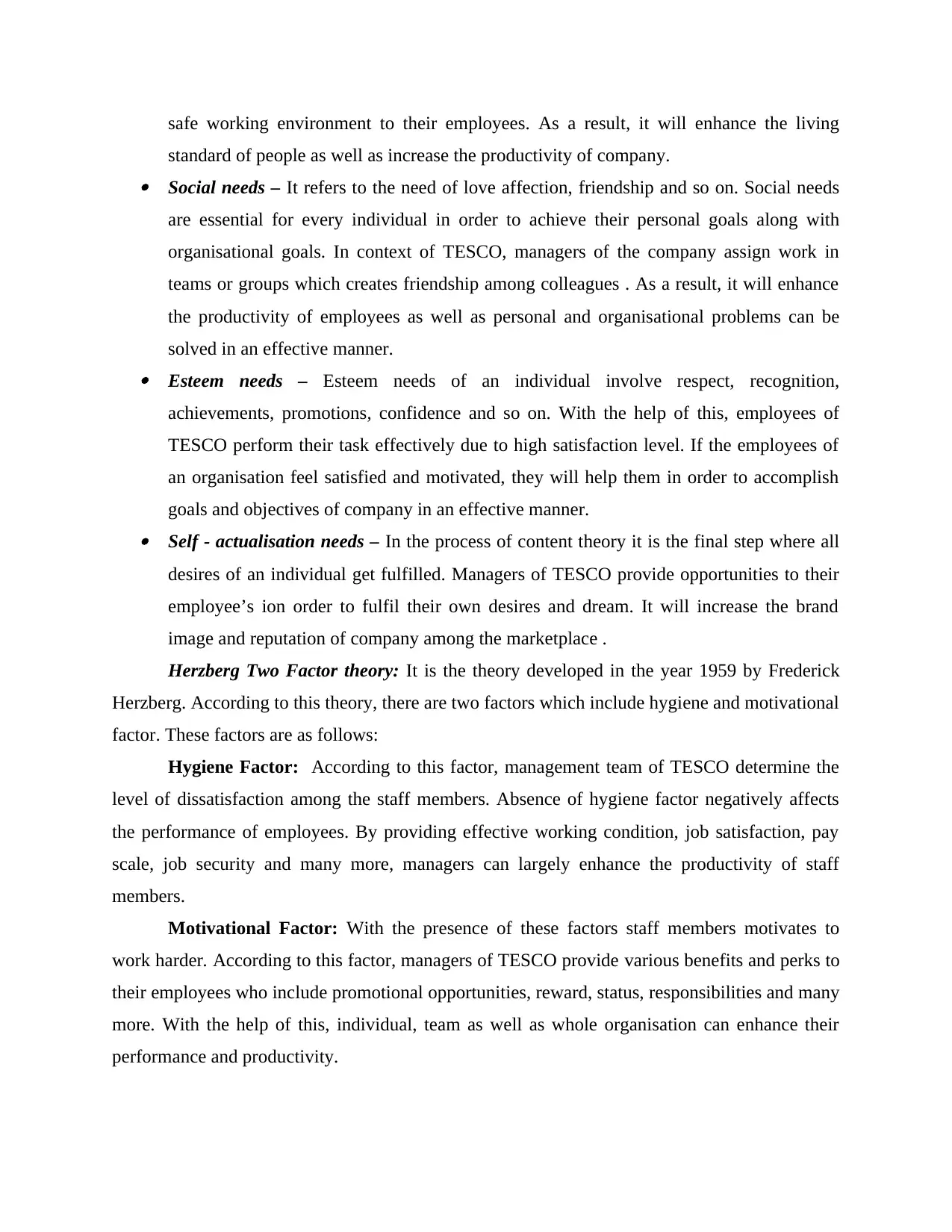
safe working environment to their employees. As a result, it will enhance the living
standard of people as well as increase the productivity of company. Social needs – It refers to the need of love affection, friendship and so on. Social needs
are essential for every individual in order to achieve their personal goals along with
organisational goals. In context of TESCO, managers of the company assign work in
teams or groups which creates friendship among colleagues . As a result, it will enhance
the productivity of employees as well as personal and organisational problems can be
solved in an effective manner. Esteem needs – Esteem needs of an individual involve respect, recognition,
achievements, promotions, confidence and so on. With the help of this, employees of
TESCO perform their task effectively due to high satisfaction level. If the employees of
an organisation feel satisfied and motivated, they will help them in order to accomplish
goals and objectives of company in an effective manner. Self - actualisation needs – In the process of content theory it is the final step where all
desires of an individual get fulfilled. Managers of TESCO provide opportunities to their
employee’s ion order to fulfil their own desires and dream. It will increase the brand
image and reputation of company among the marketplace .
Herzberg Two Factor theory: It is the theory developed in the year 1959 by Frederick
Herzberg. According to this theory, there are two factors which include hygiene and motivational
factor. These factors are as follows:
Hygiene Factor: According to this factor, management team of TESCO determine the
level of dissatisfaction among the staff members. Absence of hygiene factor negatively affects
the performance of employees. By providing effective working condition, job satisfaction, pay
scale, job security and many more, managers can largely enhance the productivity of staff
members.
Motivational Factor: With the presence of these factors staff members motivates to
work harder. According to this factor, managers of TESCO provide various benefits and perks to
their employees who include promotional opportunities, reward, status, responsibilities and many
more. With the help of this, individual, team as well as whole organisation can enhance their
performance and productivity.
standard of people as well as increase the productivity of company. Social needs – It refers to the need of love affection, friendship and so on. Social needs
are essential for every individual in order to achieve their personal goals along with
organisational goals. In context of TESCO, managers of the company assign work in
teams or groups which creates friendship among colleagues . As a result, it will enhance
the productivity of employees as well as personal and organisational problems can be
solved in an effective manner. Esteem needs – Esteem needs of an individual involve respect, recognition,
achievements, promotions, confidence and so on. With the help of this, employees of
TESCO perform their task effectively due to high satisfaction level. If the employees of
an organisation feel satisfied and motivated, they will help them in order to accomplish
goals and objectives of company in an effective manner. Self - actualisation needs – In the process of content theory it is the final step where all
desires of an individual get fulfilled. Managers of TESCO provide opportunities to their
employee’s ion order to fulfil their own desires and dream. It will increase the brand
image and reputation of company among the marketplace .
Herzberg Two Factor theory: It is the theory developed in the year 1959 by Frederick
Herzberg. According to this theory, there are two factors which include hygiene and motivational
factor. These factors are as follows:
Hygiene Factor: According to this factor, management team of TESCO determine the
level of dissatisfaction among the staff members. Absence of hygiene factor negatively affects
the performance of employees. By providing effective working condition, job satisfaction, pay
scale, job security and many more, managers can largely enhance the productivity of staff
members.
Motivational Factor: With the presence of these factors staff members motivates to
work harder. According to this factor, managers of TESCO provide various benefits and perks to
their employees who include promotional opportunities, reward, status, responsibilities and many
more. With the help of this, individual, team as well as whole organisation can enhance their
performance and productivity.
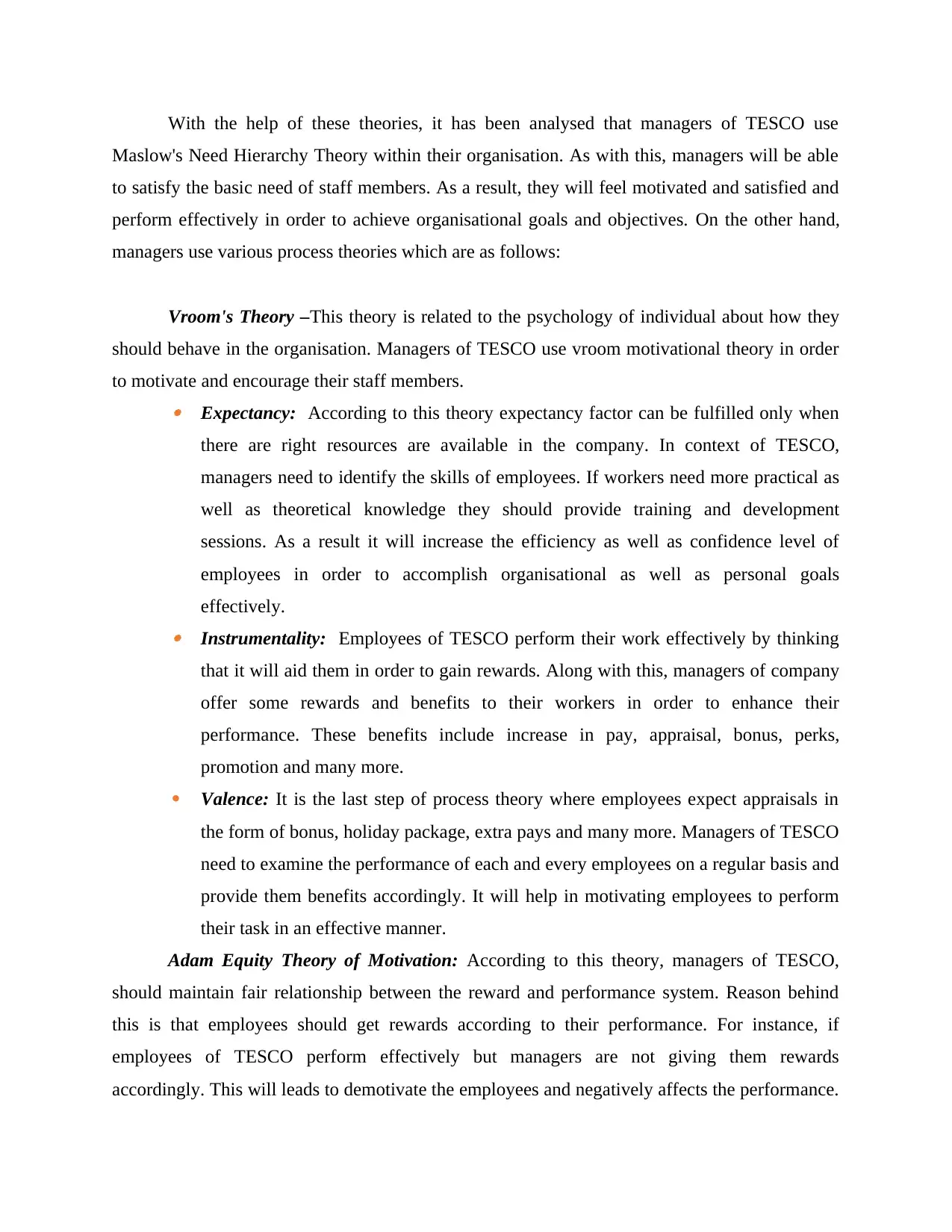
With the help of these theories, it has been analysed that managers of TESCO use
Maslow's Need Hierarchy Theory within their organisation. As with this, managers will be able
to satisfy the basic need of staff members. As a result, they will feel motivated and satisfied and
perform effectively in order to achieve organisational goals and objectives. On the other hand,
managers use various process theories which are as follows:
Vroom's Theory –This theory is related to the psychology of individual about how they
should behave in the organisation. Managers of TESCO use vroom motivational theory in order
to motivate and encourage their staff members.
Expectancy: According to this theory expectancy factor can be fulfilled only when
there are right resources are available in the company. In context of TESCO,
managers need to identify the skills of employees. If workers need more practical as
well as theoretical knowledge they should provide training and development
sessions. As a result it will increase the efficiency as well as confidence level of
employees in order to accomplish organisational as well as personal goals
effectively.
Instrumentality: Employees of TESCO perform their work effectively by thinking
that it will aid them in order to gain rewards. Along with this, managers of company
offer some rewards and benefits to their workers in order to enhance their
performance. These benefits include increase in pay, appraisal, bonus, perks,
promotion and many more.
Valence: It is the last step of process theory where employees expect appraisals in
the form of bonus, holiday package, extra pays and many more. Managers of TESCO
need to examine the performance of each and every employees on a regular basis and
provide them benefits accordingly. It will help in motivating employees to perform
their task in an effective manner.
Adam Equity Theory of Motivation: According to this theory, managers of TESCO,
should maintain fair relationship between the reward and performance system. Reason behind
this is that employees should get rewards according to their performance. For instance, if
employees of TESCO perform effectively but managers are not giving them rewards
accordingly. This will leads to demotivate the employees and negatively affects the performance.
Maslow's Need Hierarchy Theory within their organisation. As with this, managers will be able
to satisfy the basic need of staff members. As a result, they will feel motivated and satisfied and
perform effectively in order to achieve organisational goals and objectives. On the other hand,
managers use various process theories which are as follows:
Vroom's Theory –This theory is related to the psychology of individual about how they
should behave in the organisation. Managers of TESCO use vroom motivational theory in order
to motivate and encourage their staff members.
Expectancy: According to this theory expectancy factor can be fulfilled only when
there are right resources are available in the company. In context of TESCO,
managers need to identify the skills of employees. If workers need more practical as
well as theoretical knowledge they should provide training and development
sessions. As a result it will increase the efficiency as well as confidence level of
employees in order to accomplish organisational as well as personal goals
effectively.
Instrumentality: Employees of TESCO perform their work effectively by thinking
that it will aid them in order to gain rewards. Along with this, managers of company
offer some rewards and benefits to their workers in order to enhance their
performance. These benefits include increase in pay, appraisal, bonus, perks,
promotion and many more.
Valence: It is the last step of process theory where employees expect appraisals in
the form of bonus, holiday package, extra pays and many more. Managers of TESCO
need to examine the performance of each and every employees on a regular basis and
provide them benefits accordingly. It will help in motivating employees to perform
their task in an effective manner.
Adam Equity Theory of Motivation: According to this theory, managers of TESCO,
should maintain fair relationship between the reward and performance system. Reason behind
this is that employees should get rewards according to their performance. For instance, if
employees of TESCO perform effectively but managers are not giving them rewards
accordingly. This will leads to demotivate the employees and negatively affects the performance.
⊘ This is a preview!⊘
Do you want full access?
Subscribe today to unlock all pages.

Trusted by 1+ million students worldwide
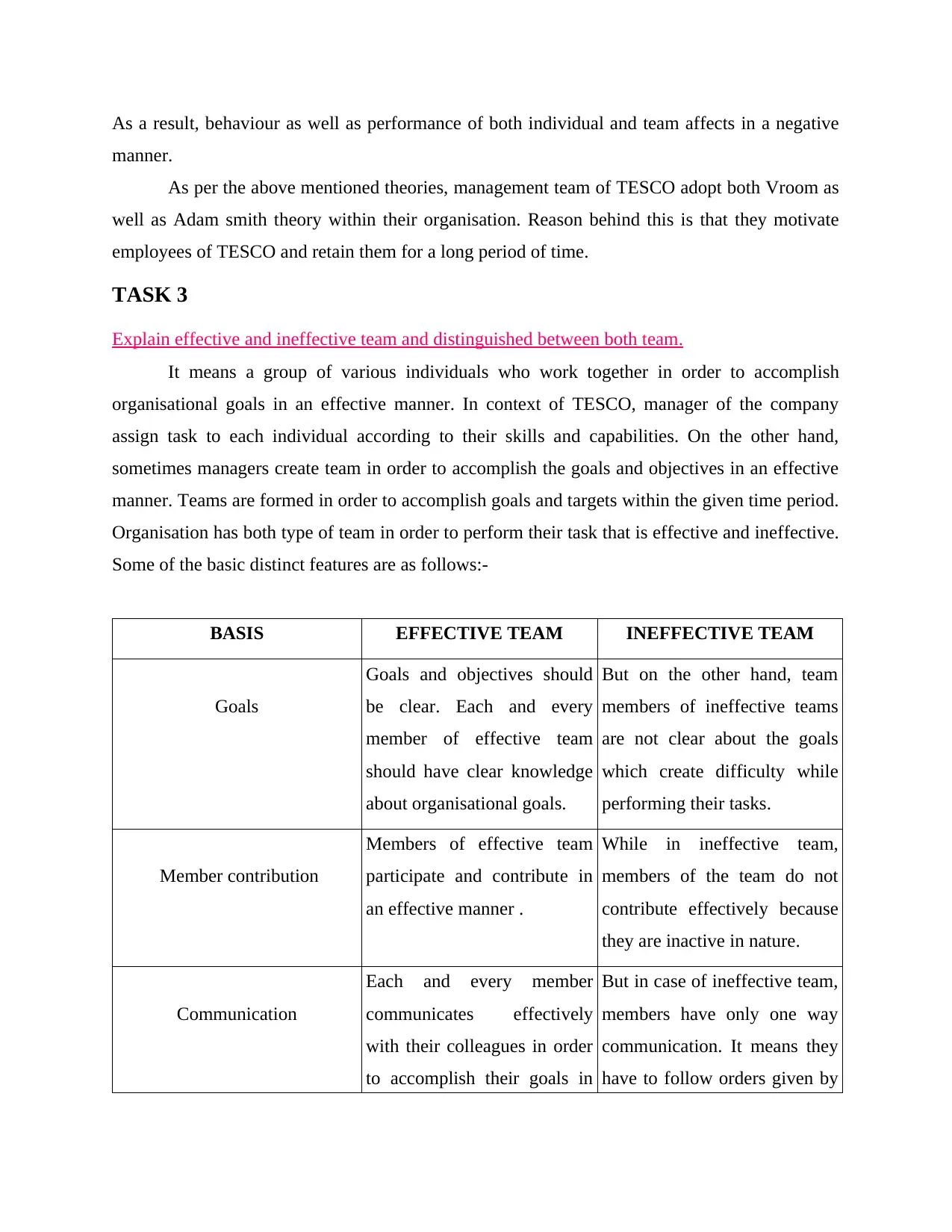
As a result, behaviour as well as performance of both individual and team affects in a negative
manner.
As per the above mentioned theories, management team of TESCO adopt both Vroom as
well as Adam smith theory within their organisation. Reason behind this is that they motivate
employees of TESCO and retain them for a long period of time.
TASK 3
Explain effective and ineffective team and distinguished between both team.
It means a group of various individuals who work together in order to accomplish
organisational goals in an effective manner. In context of TESCO, manager of the company
assign task to each individual according to their skills and capabilities. On the other hand,
sometimes managers create team in order to accomplish the goals and objectives in an effective
manner. Teams are formed in order to accomplish goals and targets within the given time period.
Organisation has both type of team in order to perform their task that is effective and ineffective.
Some of the basic distinct features are as follows:-
BASIS EFFECTIVE TEAM INEFFECTIVE TEAM
Goals
Goals and objectives should
be clear. Each and every
member of effective team
should have clear knowledge
about organisational goals.
But on the other hand, team
members of ineffective teams
are not clear about the goals
which create difficulty while
performing their tasks.
Member contribution
Members of effective team
participate and contribute in
an effective manner .
While in ineffective team,
members of the team do not
contribute effectively because
they are inactive in nature.
Communication
Each and every member
communicates effectively
with their colleagues in order
to accomplish their goals in
But in case of ineffective team,
members have only one way
communication. It means they
have to follow orders given by
manner.
As per the above mentioned theories, management team of TESCO adopt both Vroom as
well as Adam smith theory within their organisation. Reason behind this is that they motivate
employees of TESCO and retain them for a long period of time.
TASK 3
Explain effective and ineffective team and distinguished between both team.
It means a group of various individuals who work together in order to accomplish
organisational goals in an effective manner. In context of TESCO, manager of the company
assign task to each individual according to their skills and capabilities. On the other hand,
sometimes managers create team in order to accomplish the goals and objectives in an effective
manner. Teams are formed in order to accomplish goals and targets within the given time period.
Organisation has both type of team in order to perform their task that is effective and ineffective.
Some of the basic distinct features are as follows:-
BASIS EFFECTIVE TEAM INEFFECTIVE TEAM
Goals
Goals and objectives should
be clear. Each and every
member of effective team
should have clear knowledge
about organisational goals.
But on the other hand, team
members of ineffective teams
are not clear about the goals
which create difficulty while
performing their tasks.
Member contribution
Members of effective team
participate and contribute in
an effective manner .
While in ineffective team,
members of the team do not
contribute effectively because
they are inactive in nature.
Communication
Each and every member
communicates effectively
with their colleagues in order
to accomplish their goals in
But in case of ineffective team,
members have only one way
communication. It means they
have to follow orders given by
Paraphrase This Document
Need a fresh take? Get an instant paraphrase of this document with our AI Paraphraser
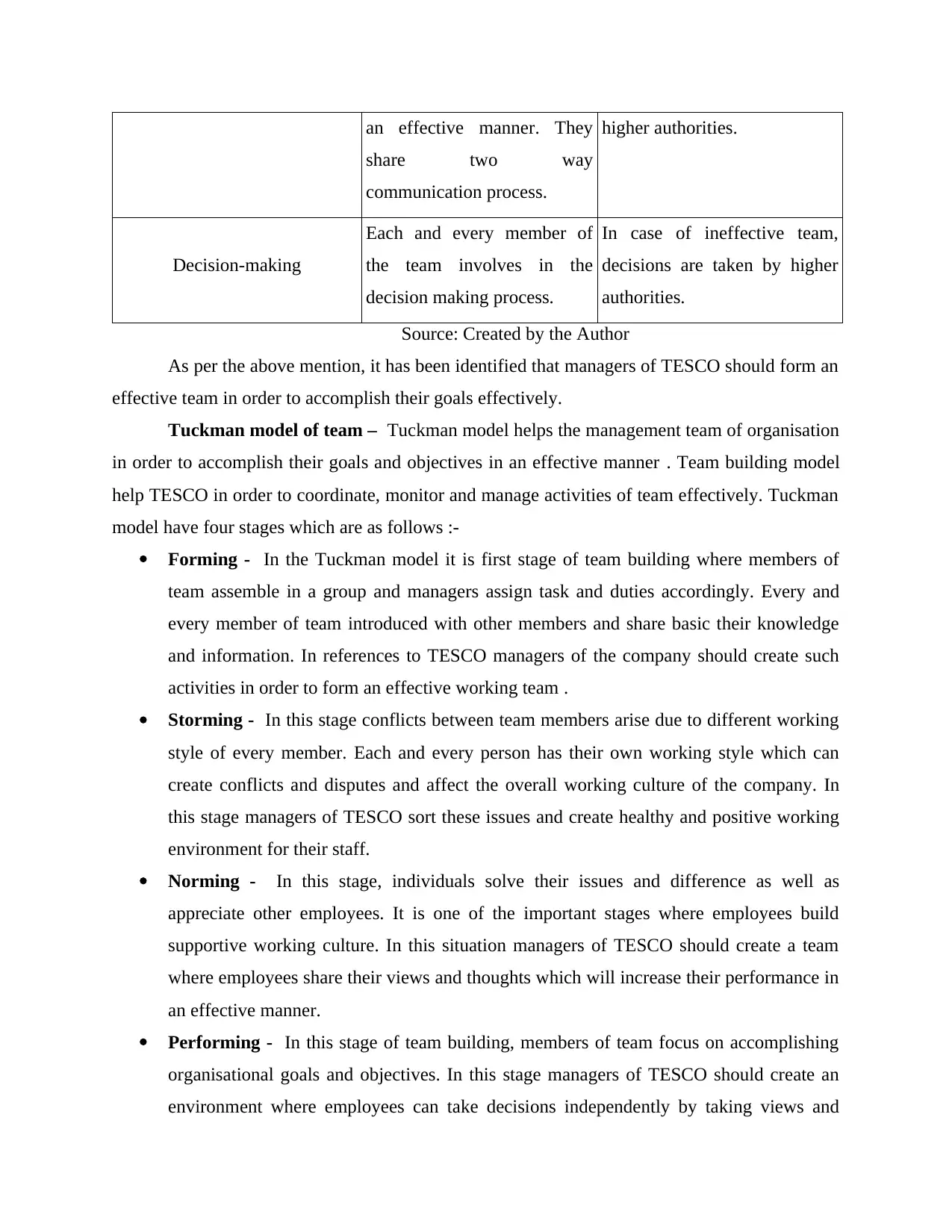
an effective manner. They
share two way
communication process.
higher authorities.
Decision-making
Each and every member of
the team involves in the
decision making process.
In case of ineffective team,
decisions are taken by higher
authorities.
Source: Created by the Author
As per the above mention, it has been identified that managers of TESCO should form an
effective team in order to accomplish their goals effectively.
Tuckman model of team – Tuckman model helps the management team of organisation
in order to accomplish their goals and objectives in an effective manner . Team building model
help TESCO in order to coordinate, monitor and manage activities of team effectively. Tuckman
model have four stages which are as follows :-
Forming - In the Tuckman model it is first stage of team building where members of
team assemble in a group and managers assign task and duties accordingly. Every and
every member of team introduced with other members and share basic their knowledge
and information. In references to TESCO managers of the company should create such
activities in order to form an effective working team .
Storming - In this stage conflicts between team members arise due to different working
style of every member. Each and every person has their own working style which can
create conflicts and disputes and affect the overall working culture of the company. In
this stage managers of TESCO sort these issues and create healthy and positive working
environment for their staff.
Norming - In this stage, individuals solve their issues and difference as well as
appreciate other employees. It is one of the important stages where employees build
supportive working culture. In this situation managers of TESCO should create a team
where employees share their views and thoughts which will increase their performance in
an effective manner.
Performing - In this stage of team building, members of team focus on accomplishing
organisational goals and objectives. In this stage managers of TESCO should create an
environment where employees can take decisions independently by taking views and
share two way
communication process.
higher authorities.
Decision-making
Each and every member of
the team involves in the
decision making process.
In case of ineffective team,
decisions are taken by higher
authorities.
Source: Created by the Author
As per the above mention, it has been identified that managers of TESCO should form an
effective team in order to accomplish their goals effectively.
Tuckman model of team – Tuckman model helps the management team of organisation
in order to accomplish their goals and objectives in an effective manner . Team building model
help TESCO in order to coordinate, monitor and manage activities of team effectively. Tuckman
model have four stages which are as follows :-
Forming - In the Tuckman model it is first stage of team building where members of
team assemble in a group and managers assign task and duties accordingly. Every and
every member of team introduced with other members and share basic their knowledge
and information. In references to TESCO managers of the company should create such
activities in order to form an effective working team .
Storming - In this stage conflicts between team members arise due to different working
style of every member. Each and every person has their own working style which can
create conflicts and disputes and affect the overall working culture of the company. In
this stage managers of TESCO sort these issues and create healthy and positive working
environment for their staff.
Norming - In this stage, individuals solve their issues and difference as well as
appreciate other employees. It is one of the important stages where employees build
supportive working culture. In this situation managers of TESCO should create a team
where employees share their views and thoughts which will increase their performance in
an effective manner.
Performing - In this stage of team building, members of team focus on accomplishing
organisational goals and objectives. In this stage managers of TESCO should create an
environment where employees can take decisions independently by taking views and
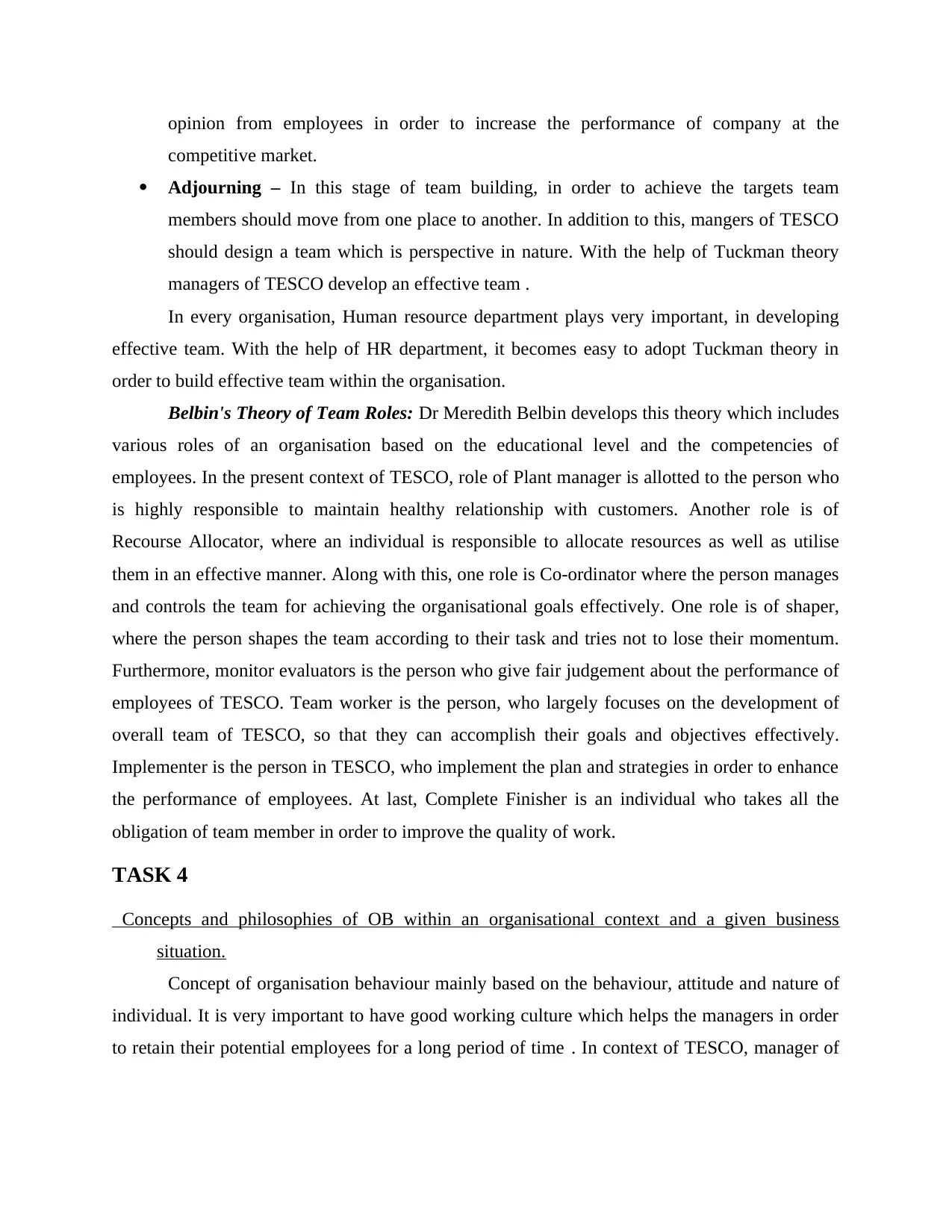
opinion from employees in order to increase the performance of company at the
competitive market.
Adjourning – In this stage of team building, in order to achieve the targets team
members should move from one place to another. In addition to this, mangers of TESCO
should design a team which is perspective in nature. With the help of Tuckman theory
managers of TESCO develop an effective team .
In every organisation, Human resource department plays very important, in developing
effective team. With the help of HR department, it becomes easy to adopt Tuckman theory in
order to build effective team within the organisation.
Belbin's Theory of Team Roles: Dr Meredith Belbin develops this theory which includes
various roles of an organisation based on the educational level and the competencies of
employees. In the present context of TESCO, role of Plant manager is allotted to the person who
is highly responsible to maintain healthy relationship with customers. Another role is of
Recourse Allocator, where an individual is responsible to allocate resources as well as utilise
them in an effective manner. Along with this, one role is Co-ordinator where the person manages
and controls the team for achieving the organisational goals effectively. One role is of shaper,
where the person shapes the team according to their task and tries not to lose their momentum.
Furthermore, monitor evaluators is the person who give fair judgement about the performance of
employees of TESCO. Team worker is the person, who largely focuses on the development of
overall team of TESCO, so that they can accomplish their goals and objectives effectively.
Implementer is the person in TESCO, who implement the plan and strategies in order to enhance
the performance of employees. At last, Complete Finisher is an individual who takes all the
obligation of team member in order to improve the quality of work.
TASK 4
Concepts and philosophies of OB within an organisational context and a given business
situation.
Concept of organisation behaviour mainly based on the behaviour, attitude and nature of
individual. It is very important to have good working culture which helps the managers in order
to retain their potential employees for a long period of time . In context of TESCO, manager of
competitive market.
Adjourning – In this stage of team building, in order to achieve the targets team
members should move from one place to another. In addition to this, mangers of TESCO
should design a team which is perspective in nature. With the help of Tuckman theory
managers of TESCO develop an effective team .
In every organisation, Human resource department plays very important, in developing
effective team. With the help of HR department, it becomes easy to adopt Tuckman theory in
order to build effective team within the organisation.
Belbin's Theory of Team Roles: Dr Meredith Belbin develops this theory which includes
various roles of an organisation based on the educational level and the competencies of
employees. In the present context of TESCO, role of Plant manager is allotted to the person who
is highly responsible to maintain healthy relationship with customers. Another role is of
Recourse Allocator, where an individual is responsible to allocate resources as well as utilise
them in an effective manner. Along with this, one role is Co-ordinator where the person manages
and controls the team for achieving the organisational goals effectively. One role is of shaper,
where the person shapes the team according to their task and tries not to lose their momentum.
Furthermore, monitor evaluators is the person who give fair judgement about the performance of
employees of TESCO. Team worker is the person, who largely focuses on the development of
overall team of TESCO, so that they can accomplish their goals and objectives effectively.
Implementer is the person in TESCO, who implement the plan and strategies in order to enhance
the performance of employees. At last, Complete Finisher is an individual who takes all the
obligation of team member in order to improve the quality of work.
TASK 4
Concepts and philosophies of OB within an organisational context and a given business
situation.
Concept of organisation behaviour mainly based on the behaviour, attitude and nature of
individual. It is very important to have good working culture which helps the managers in order
to retain their potential employees for a long period of time . In context of TESCO, manager of
⊘ This is a preview!⊘
Do you want full access?
Subscribe today to unlock all pages.

Trusted by 1+ million students worldwide
1 out of 17
Related Documents
Your All-in-One AI-Powered Toolkit for Academic Success.
+13062052269
info@desklib.com
Available 24*7 on WhatsApp / Email
![[object Object]](/_next/static/media/star-bottom.7253800d.svg)
Unlock your academic potential
Copyright © 2020–2026 A2Z Services. All Rights Reserved. Developed and managed by ZUCOL.



